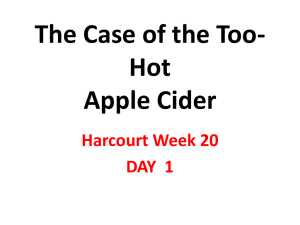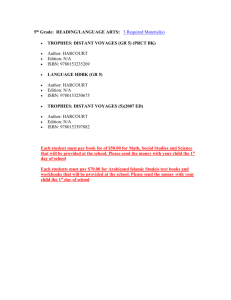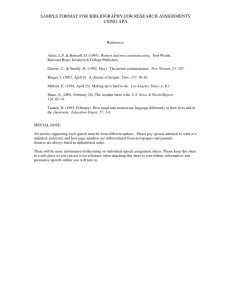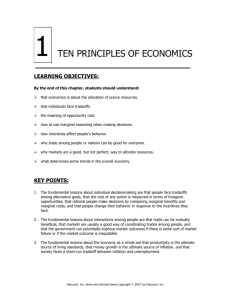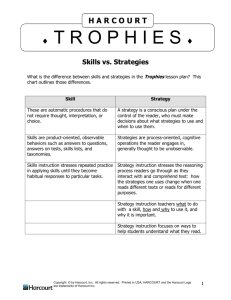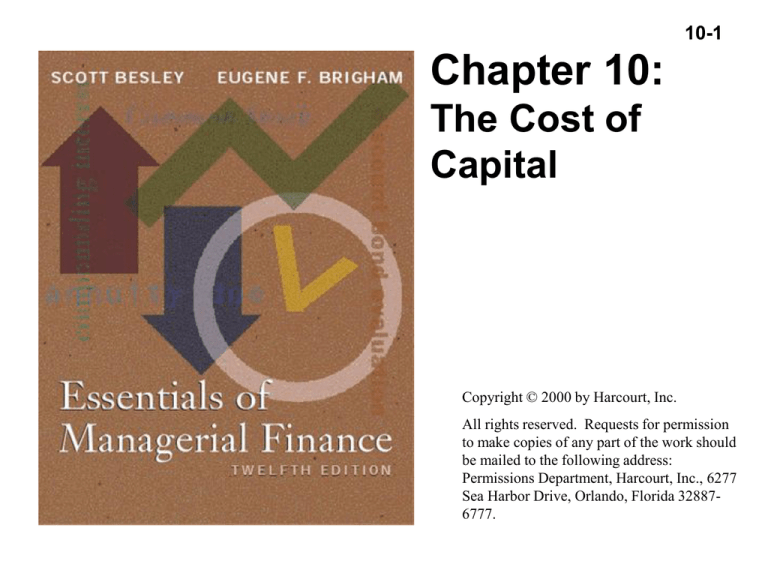
10-1
Chapter 10:
The Cost of
Capital
Copyright © 2000 by Harcourt, Inc.
All rights reserved. Requests for permission
to make copies of any part of the work should
be mailed to the following address:
Permissions Department, Harcourt, Inc., 6277
Sea Harbor Drive, Orlando, Florida 328876777.
Copyright (C) 2000 by Harcourt, Inc. All rights
reserved.
10-2
Cost of Capital
The firm’s average cost of funds, which is
the average return required by the firm’s
investors
What must be paid to attract funds
Copyright (C) 2000 by Harcourt, Inc. All rights
reserved.
10-3
The Logic of the Weighted
Average Cost of Capital
The use of debt impacts on the ability to
use equity, and vice versa, so the
weighted average cost must be used to
evaluate projects, regardless of the
specific financing used to fund a
particular project.
Copyright (C) 2000 by Harcourt, Inc. All rights
reserved.
10-4
Basic Definitions
Capital Component
Types of capital used by firms to raise
money
kd
= before tax interest cost
kdT
= kd(1-T) = after tax cost of debt
kps
= cost of preferred stock
ks
ke
= cost of retained earnings
= cost of external equity (new stock)
Copyright (C) 2000 by Harcourt, Inc. All rights
reserved.
10-5
Basic Definitions
WACC = weighted average cost of capital
Capital Structure
A combination of different types of capital
used by a firm
Copyright (C) 2000 by Harcourt, Inc. All rights
reserved.
10-6
After-Tax Cost of Debt
The relevant cost of new debt
Taking into account the tax deductibility
of interest
Used to calculate the WACC
kdT = bondholders’ required rate of return
minus tax savings
kdT = kd - (kd x T) = kd(1-T)
Copyright (C) 2000 by Harcourt, Inc. All rights
reserved.
10-7
Cost of Preferred Stock
Rate of return investors require on the
firm’s preferred stock
The preferred dividend divided by the net
issuing price
D
D
ps
ps
k
ps NP P - Flotationcosts
0
Copyright (C) 2000 by Harcourt, Inc. All rights
reserved.
10-8
Cost of Retained Earnings
Rate of return investors require on the
firm’s common stock
D̂
k k
RP 1 g k̂
s
RF
s
P
0
Copyright (C) 2000 by Harcourt, Inc. All rights
reserved.
10-9
The CAPM Approach
k k
k - k
β
s
RF M
RF s
Copyright (C) 2000 by Harcourt, Inc. All rights
reserved.
10-10
The Bond-Yield-Plus-Premium
Approach
Estimating a risk premium above the
bond interest rate
Judgmental estimate for premium
“Ballpark” figure only
k Bon dyie ld Riskpre m iu m
s
10% 4% 14%
Copyright (C) 2000 by Harcourt, Inc. All rights
reserved.
10-11
The Discounted Cash Flow (DCF)
Approach
Price and expected rate of return on a
share of common stock depend on the
dividends expected on the stock
D̂
D̂
D̂
1
2 ...
P
0 1 k 1 1 k 2
1 k
s
s
s
D̂
t
t
1
k
t 1
s
Copyright (C) 2000 by Harcourt, Inc. All rights
reserved.
10-12
The Discounted Cash Flow (DCF)
Approach
D̂
D̂
D̂
1
2
P
...
0 1 k 1 1 k 2
1 k
s
s
s
D̂
D̂
t
1 if g is constant
t
k
g
1
k
t 1
s
s
D̂
k k̂ 1 g
s
s P
0
Copyright (C) 2000 by Harcourt, Inc. All rights
reserved.
10-13
Cost of Newly Issued
Common Stock
External equity, ke
based
on the cost of retained earnings
adjusted for flotation costs (the expenses
of selling new issues)
D̂
D̂
1 g
k 1 g
s NP
P 1 F
0
Copyright (C) 2000 by Harcourt, Inc. All rights
reserved.
10-14
Target Capital Structure
Optimal Capital Structure
Percentage of debt, preferred
stock, and common equity in
the capital structure that will
maximize the price of the
firm’s stock
Copyright (C) 2000 by Harcourt, Inc. All rights
reserved.
10-15
Weighted Average Cost of Capital,
WACC
A weighted average of the component costs
of debt, preferred stock, and common equity
Proportion After - tax Proportion Cost of Proportion Cost of
of
cost
of
of
preferred
preferred
of
common
common
debt debt stock stock equity equity
W
d
k
dT
W
ps
k
ps
W
s
k
s
Copyright (C) 2000 by Harcourt, Inc. All rights
reserved.
10-16
Marginal Cost of Capital
MCC
The cost of obtaining another dollar
of new capital
The weighted average cost of the
last dollar of new capital raised
Copyright (C) 2000 by Harcourt, Inc. All rights
reserved.
10-17
Marginal Cost of Capital
Marginal Cost of Capital Schedule
A graph that relates the firm’s
weighted average of each dollar of
capital to the total amount of new
capital raised
Reflects changing costs depending
on amounts of capital raised
Copyright (C) 2000 by Harcourt, Inc. All rights
reserved.
10-18
MCC Schedule
Weighted Average Cost
of Capital (WACC) (%)
WACC3=11.5%
11.5 WACC2=11.0%
11.0 -
10.5 -
WACC1=10.5%
100
150
New Capital
Raised (millions
of dollars)
Copyright (C) 2000 by Harcourt, Inc. All rights
reserved.
10-19
Break Point
BP
The dollar value of new capital that
can be raised before an increase in
the firm’s weighted average cost of
capital occurs
Total amount of lower cost capital of a given type
Break
Point Proportion of this type of capital in the capital structure
Copyright (C) 2000 by Harcourt, Inc. All rights
reserved.
10-20
MCC Schedule
Weighted Average Cost
of Capital (WACC) (%)
WACC3=11.5%
11.5 WACC2=11.0%
11.0 10.5 -
WACC1=10.5%
BPRE
100
BPDebt
150
New Capital
Raised (millions of
dollars)
Copyright (C) 2000 by Harcourt, Inc. All rights
reserved.
10-21
MCC Schedule
Schedule and break points depend
on capital structure used
Copyright (C) 2000 by Harcourt, Inc. All rights
reserved.
10-22
MCC Schedule
Weighted Average Cost
of Capital (WACC) (%)
Smooth, or Continuous,
Marginal Cost of Capital
Schedule
WACC
0-
Dollars of New Capital Raised
Copyright (C) 2000 by Harcourt, Inc. All rights
reserved.
10-23
Combining the MCC and
Investment Opportunity
Schedules
Use the MCC schedule to find the cost
of capital for determining projects’ net
present values
Investment Opportunity Schedule (IOS)
Graph of the firm’s investment
opportunities ranked in order of the
projects’ internal rate of return
Copyright (C) 2000 by Harcourt, Inc. All rights
reserved.
10-24
Combining the MCC and
Investment Opportunity
Schedules
Percent
12.0 -
IRRC = 12.0%
IRRB = 11.6%
11.5 -
WACC3=11.5%
IRRD = 11.5%
IRRE = 11.3%
WACC2=11.0%
11.0 -
MCC
IRRA = 10.8%
WACC1=10.5%
10.5 -
Optimal Capital
Budget - $139
20
40
60
80
100 120 140
IOS
160
180
New Capital Raised and invested
(millions of dollars)
Copyright (C) 2000 by Harcourt, Inc. All rights
reserved.
10-25
End of Chapter 10
The Cost of Capital
Copyright (C) 2000 by Harcourt, Inc. All rights
reserved.

